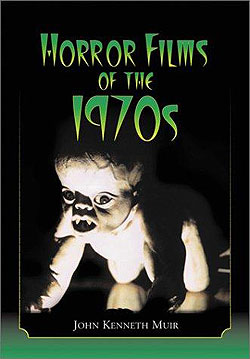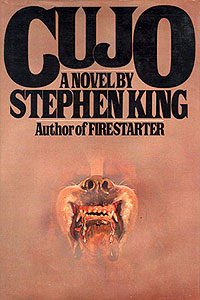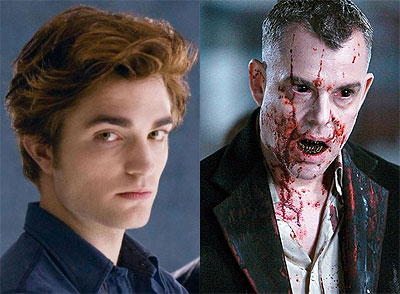Horror Films Of The 1970s, By John Kenneth Muir
Published on September 29th, 2011 in: Book Reviews, Books, Halloween, Horror, Movies, Reviews |
As a film fan, I’m an unabashed lover of the 1970s. In the introduction to Horror Films of the 1970s, film and television critic John Kenneth Muir describes why in two words: “savage cinema.” There truly was something different about films of that decade, and horror films of the ’70s are no exception. In fact, sometimes lines between horror and non-horror were blurred so successfully that it’s difficult to define the exact genres of films like Deliverance or Straw Dogs, both of which are discussed in Muir’s book.
Part of what makes the “savage cinema” so unique and thrilling, claims Muir, is that it presented viewers with a universe in which there were no answers. Yet, he quotes documentary filmmaker Adam Simon, who says that horror can be “open to the traumas of the world” in a way which will “naturally convey truths.” This nexus between no answers and universal truths is precisely why horror films of the 1970s are so unique and so thrilling.
Fate And Fault In A Ford Pinto: The Everyday Horror Of Cujo
Published on September 29th, 2011 in: Books, Halloween, Horror, Retrovirus |By AJ Wood

On a recent warm summer night I was re-reading my favorite Stephen King novel, Cujo, by the open window. Just as King was describing how the foamy-mouthed mangy dog was munching into a man’s throat with quite serious OM NOM NOM gusto, my cat decided to come to the window and play a little joke on me.
“Meow?” he said in his meanest, growlingest voice (at least as I heard it).
“AHHHHHHH!” I replied, my body jolting, nearly tossing my e-book across the room.
Two important things I learned that evening: 1) the same stuff I use to clean up the cat’s pee works well at cleaning up my own accidents and 2) exactly what it is about Cujo that really scares the bejeezus out of me.
< (more…)
The Haunter Of The Dark: Horror In Radio
Published on September 29th, 2011 in: Books, Halloween, Horror, Radio, Retrovirus, Science Fiction |By Paul Casey
“It. Is. Later. Than. You. Think. Lights Out brings you stories of the supernatural and the supernormal, dramatizing the fantasies and the mysteries of the unknown. We tell you this frankly. So if you wish to avoid the excitement and tension of these imaginative plays, we urge you, calmly, but sincerely to turn off your radio, now. And now, Lights Out, everybody.”
Everything Undead Is New Again: Are Vampires Still Vicious?
Published on September 29th, 2011 in: Books, Comics, Halloween, Horror, Movies, TV |By Kai Shuart
So, I’m just going to get down to the nitty-gritty: I love me some vampires. They’re violent, they’re sexy, and they’re transgressors of any religious, sexual, or social mores a mortal can think up. And they have the power to give that power to anyone they see fit.
But I am a vampire snob. Don’t come across my way with any of that Stephenie Meyer weak sauce; give me Eli from Let The Right One In, Anne Rice’s Lestat, Cassidy from The Preacher comics, Buffy’s Dru or Spike, or even Barnabas Collins from Dark Shadows (a callous hedonist turned vicious killer vampire turned tortured hero . . . yeeeah, with all due respect to Joss Whedon, the archetype didn’t start with a certain billowy-coated King of Pain). To me, a vampire is first and foremost a killer, and a gleeful one at that. Well, we should all take pride in our work . . .

Twilight vs. 30 Days Of Night
I couldn’t help but wonder, though: why does each successive interpretation of what a vampire is and what a vampire does seem so tame compared to the early pop culture incarnations set forth by people like Bram Stoker and F.W. Murnau? This is a monster whose father was Vlad the Impaler, one of the bloodiest, most sadistic dictators who ever walked the face of the Earth; and whose mother was Elizabeth Bathory, a woman who threw orgies and bathed in virgin’s blood because she believed it kept her youthful. Now they sparkle? All snark aside, I had to ask how this shift took place.
Upon consideration, I think part of this comes from a very human need to make friends with what scares us. The thinking goes that if we somehow forge a connection with the monsters (both literal and figurative) that keep us awake at night, the monsters will eventually overcome their natures and spare our lives. This is exactly how the romances play out in modern vampire lore: Twilight’s Edward can smell Bella’s blood a mile away, but doesn’t do the deed because he loves her so much. (This is me. Retching.) In True Blood, there’s something in Sookie Stackhouse’s blood that drives vampires crazy, but Bill Compton protects her from some of his more primal cohorts. To be fair, there’s a lot of this dynamic between Oskar and Eli in the book Let Me In, but at least there’s a question of whether protecting Oskar wasn’t just a by-product of Eli procuring a meal.
The fact that vampires have grown significantly less vicious and amoral as time has gone on could also be because it plays into the rather marketable notion that a good woman can reform a bad boy. Even though Buffy the Vampire Slayer has many, many positive points, even that great show is guilty of this. In the third season, Angel is somehow brought back from the hell dimension to which Buffy sent him after his reversion to his evil Angelus form. In this form, he psychologically tortured Buffy through attacking—and in the case of Jenny Calendar, killing—Buffy’s allies.
After Angel’s return, Buffy finds him in an extremely feral state. But what does our heroine do? Instead of thinking that maybe she was a bit justified in killing her former lover and sending him to hell, she is convinced that the Angel she loved is still in there somewhere. Because of this, she makes it her mission to tame him through regular visits during which she feeds him, reads to him, and does Tai Chi with him.
A final reason for these shifting interpretations of vampires could be the political climate. The massively popular Twilight series was first published during the Bush administration, a period in which everything seemed oriented towards conventional sexual mores. Sure enough, Bella and Edward don’t have sex at all until they’re lawfully wed.
By contrast, Anne Rice’s Interview with the Vampire was released in 1976, within a much more liberal environment that was likely influenced by the attitudes of the previous decade. This could account in some small part for the fact that a story that features Lestat, a sybaritic, gleeful killer vampire who makes no bones about how much he enjoys being a vampire, sold so well. Also, Rice was much less squeamish about the homoerotic elements of her story. For example, as melancholy as he is, Louis finds a “companion” in fellow vampire Armand. It’s not explicitly stated that the two are lovers, but there is certainly ample room for that interpretation.
Regardless of whether these shifts have come about due to political climate, human nature, or the marketing of gendered relationship roles, one thing is for certain: I will keep taking my vampires straight up. Fortunately for me and other like-minded individuals, a much more animalistic interpretation of the vampire has recently been coming into prominence, quite possibly in response to the vampire’s role as the dark, sexy, forbidding romantic figure.
Vampires in the film and comic 30 Days of Night, with their ghostly faces and mouths full of razor-sharp teeth, have a purely animal instinct to kill rather than seduce their prey, and they certainly don’t worry about how killing people affects the state of their immortal soul. Proving that everything comes full circle, this seems to be reverting to the much earlier pop culture incarnations of vampires, borrowing the gnarled claws and batlike visage from Murnau’s Nosferatu.
Will this interpretation eventually overtake its sparkly, more tween-friendly counterpart? Time will tell, but I for one really hope so . . .
Five Horror Movies For People Who Don’t Like Horror Movies
Published on September 29th, 2010 in: Halloween, Horror, Listicles, Movies, Staff Picks, Top Five Lists |The autumnal season is upon us, and with it, the onslaught of Halloween in all its grease-painted, fun-sized glory. This is great news for the gorehounds and horror-movie fanatics . . . but what of us petite flowers who faint at the sight of blood? You, my friends, are in luck! Herewith are five feature films that eschew the viscera in favor of suspense and chills.
(more…)
The Rotary Phone of Doom: My Top Five Scariest Things
Published on September 29th, 2010 in: Canadian Content, Halloween, Horror, Listicles, Staff Picks, Top Five Lists |By Emily Carney

5. Recurring dreams about high school
I have had the same dream continually over the last few years. It’s about high school. Mind you, it’s not a bittersweet, Breakfast Club-style reminiscence; the dream involves me having to go BACK to high school after being informed not-so-politely BY MAIL that I had somehow “forgotten” to attain my high school diploma. The same thing happens in every damn dream: for some reason, I start skipping classes, I fail most of them, and thus I become trapped in high school, never being able to get out. Suddenly, the halcyon greenish-blue corridors of good old East Lake High school become a horror show on par with Stanley Kubrick’s The Shining. By the way, I generally had a good high school experience in real life, so I have no idea where this dream is coming from.
(more…)
Killer Instinct: Ten Psychotics With Style
Published on September 29th, 2010 in: Halloween, Horror, Listicles, Movies, Staff Picks, Top Ten Lists |Idea by Matt Keeley
With Contributions By . . .
Everyone knows that psychos in movies are good at one thing: killing. But honestly, that’s unfair. So many of these “homicidal maniacs” as some might call them have other interests. After all, are YOU just one thing? It’s time we set the record straight and give credit where it’s due, so here’s Popshifter‘s list of top multi-faceted murderers in alphabetical order because we don’t want to play favorites and take chances incurring their wrath!
Let’s Have Fun With Shonen Knife: A Video Interview
Published on September 29th, 2010 in: Culture Shock, Current Faves, Feminism, Halloween, Horror, Interviews, Video |By Matt Keeley
I have been listening to Shonen Knife for literally half my life. I’m 30 now, so do the math! That being said, I’ve only been able to see them live twice: once on the Gokigen Tour in 2005, and recently for the new album Free Time. There’ve been line-up changes since the first time, but the sound is the same and just as good as it always was.
I was so thrilled to interview Shonen Knife before their show at the Tractor Tavern in Seattle—the first stop on the new US tour. I got to talk to all of them and ask Naoko Yamano about her songwriting, finding records in Japan when she was growing up, Japanese vs. English, writing about animals and food, and more, including the band’s recent experience playing in China. She even tells a scary story, seeing as it is the Halloween issue and all!
(more…)
Blood Writes: Q&A With Author Alex Bledsoe
Published on September 29th, 2010 in: Books, Halloween, Horror, Q&A |By Lisa Anderson
Alex Bledsoe is the author of the novels of the Memphis Vampires: 2009’s Blood Groove and The Girls with Games of Blood, which was released earlier this year (both from Tor books). For Popshifter‘s Halloween Horrors issue, he recently took time to answer some of my questions about writing and the bloodthirsty monsters currently enjoying such popularity.
(more…)